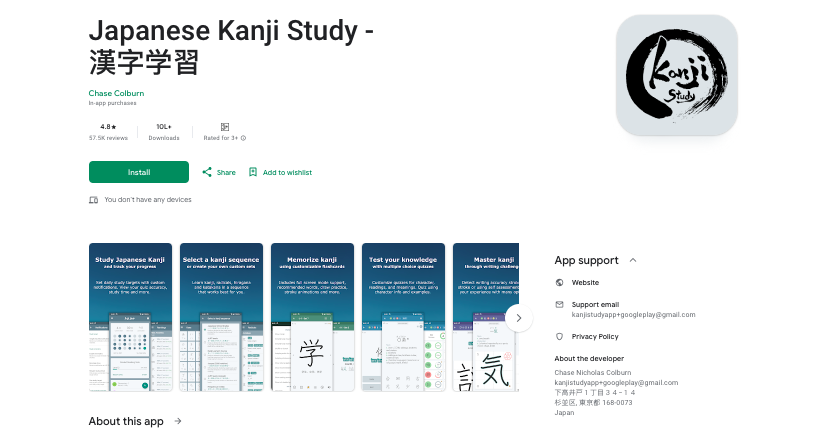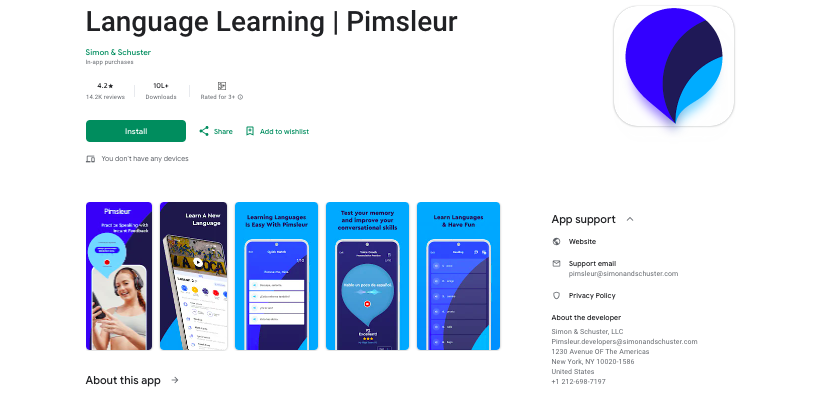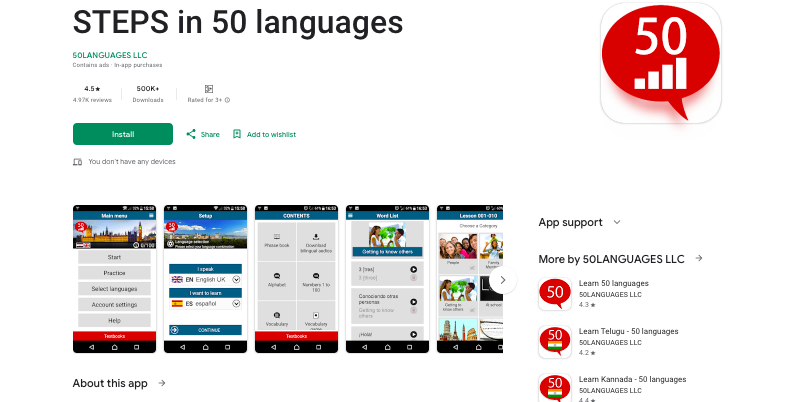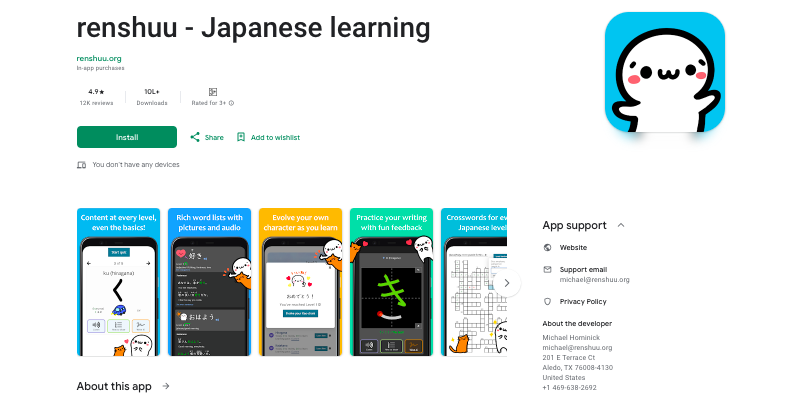Learning Japanese has never been more accessible, but what happens when you’re on a plane, commuting through dead zones, or simply want to conserve data?
Offline functionality transforms your smartphone into a portable Japanese classroom that works anywhere, anytime.
Whether you’re mastering kanji stroke order, drilling vocabulary through spaced repetition, or practicing pronunciation, these apps ensure your learning journey never stops, even when your internet connection does.
Let’s learn more about these apps.
Also Read: Apps Better Than Duolingo
1. Anki
Anki is the gold standard for spaced repetition flashcard learning, offering unparalleled customization for Japanese study. This powerhouse app allows you to create personalized decks or download community-made sets covering everything from basic hiragana to advanced kanji recognition. Its algorithm intelligently schedules reviews based on your performance, ensuring optimal retention. Once downloaded, all your flashcard decks work completely offline, making it perfect for consistent daily practice regardless of connectivity.
Key Features:
- Fully customizable flashcard system with multimedia support
- Advanced spaced repetition algorithm for optimal memory retention
- Extensive collection of user-generated Japanese decks
- Complete offline functionality after initial download
- Cross-platform synchronization when online
- Support for audio, images, and complex formatting
Also Read: Best Alternatives To Anki
2. LingoDeer
LingoDeer stands out as a comprehensive Japanese learning platform designed specifically for Asian languages, offering structured lessons that progress logically from beginner to intermediate levels. The app excels at teaching Japanese grammar concepts clearly while incorporating all three writing systems seamlessly. Its offline mode allows you to download entire lesson packs, ensuring uninterrupted learning sessions. The app’s gamified approach keeps motivation high while maintaining academic rigor that many other apps lack.
Key Features:
- Downloadable lesson packs for complete offline access
- Structured curriculum covering hiragana, katakana, and kanji
- Clear grammar explanations with practical examples
- Interactive exercises including listening and speaking practice
- Progress tracking and achievement system
- Alphabet learning modules with stroke order guidance
Check Out: iPad Apps That Support Language Learning
3. Duolingo
Duolingo has evolved into a robust Japanese learning platform that combines accessibility with surprising depth, making it ideal for beginners and casual learners. The app’s bite-sized lessons fit perfectly into busy schedules while covering essential vocabulary, grammar patterns, and cultural context. Its offline lessons feature allows you to download content in advance, ensuring your daily streak continues even without internet access. The gamification elements and social features create an engaging learning environment that encourages consistency.
Key Features:
- Downloadable lessons for offline practice
- Comprehensive coverage of hiragana, katakana, and basic kanji
- Streak tracking and achievement badges for motivation
- Stories and podcasts for intermediate learners
- Community forums and discussion features
- Free access to core learning content
Check Out: Best Preply Alternatives
4. Rosetta Stone
Rosetta Stone brings its renowned immersive methodology to Japanese learning, emphasizing natural language acquisition through context and visual association rather than translation. The platform’s TruAccent speech recognition technology helps perfect pronunciation, while its structured progression builds confidence systematically. Once lessons are downloaded, the entire experience works offline, allowing for deep, focused study sessions. This premium app particularly excels at developing intuitive understanding of Japanese sentence structure and natural speech patterns.
Key Features:
- Complete offline mode after downloading lessons
- Immersive learning without English translations
- Advanced speech recognition for pronunciation practice
- Structured curriculum from beginner to advanced levels
- Visual learning with contextual image associations
- Lifetime access options available
Also Read: Anki vs Quizlet
5. Memrise
Memrise transforms vocabulary acquisition into an engaging, memorable experience through its unique combination of spaced repetition and user-generated mnemonics. The app’s strength lies in its community-driven content, where learners share creative memory aids that make difficult kanji and vocabulary stick permanently. Its offline mode ensures that downloaded courses remain accessible without internet, perfect for consistent daily practice. The platform particularly excels at helping learners remember complex characters through visual and conceptual associations.
Key Features:
- Offline course downloads for uninterrupted learning
- Community-created mnemonics and memory aids
- Spaced repetition system for long-term retention
- Video content with native speaker pronunciations
- Gamified learning with points and leaderboards
- Multiple difficulty levels and specialized vocabulary sets
Explore: English Learning Apps For Kids
6. Kanji Study
Kanji Study delivers focused, systematic kanji learning through carefully organized lessons that progress from elementary to advanced levels following the Japanese educational system. This specialized app transforms the daunting task of memorizing thousands of characters into manageable, structured study sessions with detailed stroke animations and multiple reading examples. Its robust offline capabilities ensure that all kanji data, practice exercises, and progress tracking remain fully functional without internet access. The app particularly excels at helping learners understand the relationships between radicals, characters, and their various readings through comprehensive reference materials and contextual examples.
Key Features:
- Complete offline database of over 6,000 kanji characters
- Animated stroke order demonstrations for proper writing technique
- JLPT level organization with systematic progression tracking
- Multiple quiz modes including recognition, meaning, and reading tests
- Detailed character information including etymology and usage examples
- Customizable study lists and spaced repetition scheduling
7. Busuu
Busuu offers a well-rounded Japanese learning experience that combines AI-powered lessons with human feedback from native speakers. The app’s offline mode allows you to download entire lesson units, ensuring comprehensive study sessions without connectivity concerns. Its strength lies in balanced skill development across speaking, listening, reading, and writing, with particular attention to practical conversation skills. The platform’s McGraw-Hill certification adds credibility to your learning achievements, making it valuable for academic or professional purposes.
Key Features:
- Complete lesson downloads for offline study
- AI-powered personalized study plans
- Native speaker feedback on speaking exercises
- Official McGraw-Hill certificates upon completion
- Comprehensive skill coverage including conversation practice
- Business Japanese modules for professional development
8. Pimsleur
Pimsleur’s audio-focused methodology prioritizes speaking and listening skills, making it exceptional for developing conversational Japanese quickly and naturally. The app’s emphasis on graduated interval recall trains your brain to retrieve language automatically, building genuine fluency rather than just recognition. All audio lessons work completely offline once downloaded, perfect for hands-free learning during commutes, workouts, or daily activities. This approach particularly benefits learners who want to speak confidently from early stages rather than focusing primarily on reading and writing.
Key Features:
- Full audio lessons available offline after download
- Graduated interval recall for automatic language retrieval
- Hands-free learning perfect for multitasking
- Focus on speaking and listening skills development
- 30-minute lessons designed for daily consistency
- Core vocabulary and essential conversation patterns
9. Japanese Learning – 50 Languages
This practical app focuses on essential Japanese phrases and vocabulary needed for real-world communication, making it perfect for travelers and beginners seeking immediate practical application. The content covers 100 lessons progressing from basic greetings to complex conversations, all available completely offline. Its strength lies in audio pronunciation from native speakers and practical phrase categories that address common communication needs. The straightforward interface eliminates distractions, allowing focused learning sessions that build confidence quickly.
Key Features:
- Complete offline functionality with no internet required
- 100 lessons covering practical conversation topics
- Native speaker audio for proper pronunciation
- Organized by situational categories (restaurant, hotel, shopping, etc.)
- Simple interface optimized for quick learning
- Suitable for complete beginners and travelers
Check Out: Free Tools For Visual Learning Environments
10. Renshuu
Renshuu stands out as a comprehensive, community-driven platform that covers all aspects of Japanese learning while maintaining complete offline functionality. The app excels at providing diverse practice methods including vocabulary drills, grammar exercises, kanji writing practice, and sentence construction. Its offline mode ensures that your personalized study sets and progress remain accessible anywhere. The platform’s strength lies in its flexibility and depth, allowing learners to customize their experience while benefiting from community-generated content and study schedules.
Key Features:
- Complete offline access to all downloaded content
- Comprehensive coverage of vocabulary, grammar, and kanji
- Customizable study schedules and personal goal setting
- Community-generated content and study materials
- Handwriting practice for kanji stroke order
- Integration with various Japanese proficiency test preparations
Check Out: Brainscape vs Anki
Conclusion
Mastering Japanese requires consistent daily practice, and these offline-capable apps ensure that connectivity never becomes a barrier to your progress.
From Anki’s powerful spaced repetition system to LingoDeer’s structured curriculum and Pimsleur’s conversation-focused approach, each app offers unique strengths that cater to different learning styles and goals.
With one of these apps by your side, learning Japanese looks like a fulfilled dream.
Pick one and get started.
Enjoyed the post?

















